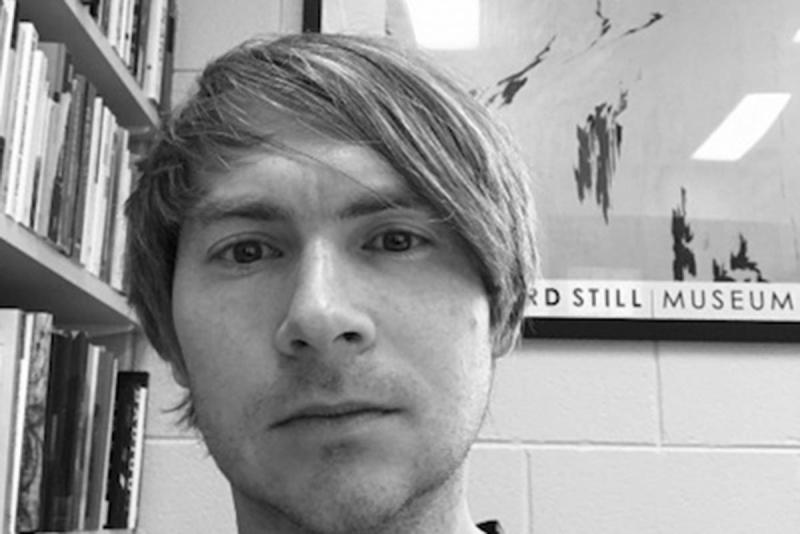Troubled by Societal Ills, Distinguished Scholar Thomas Nail Unearths Roots in “Philosophy of Movement”

A passion for punk music as a teenager unexpectedly launched Philosophy Professor Thomas Nail on a circuitous path to a new way of looking at political philosophy from a historical perspective. “I was listening to lyrics and references and trying to understand, for instance, what capitalism was,” he said. “I read Noam Chomsky for the first time, started studying political theory and then got into political activism as an undergraduate at the University of North Texas where I joined every activist group I could find.”
Attending graduate school at the University of Oregon where he later received a PhD in Philosophy in 2011, intensified his political engagement.
“I moved to Eugene, Oregon to join the anarchists in the wake of the riots in Seattle against the World Trade Organization (WTO).” he said. The experience inspired and led him to pursue political theory based on environmental activism.
In his final year of grad school, Nail received a Fulbright and spent the year of 2009-2010 in Canada working with a migrant justice group called No One Is Illegal. The University of Denver subsequently hired him as a post-doctorate fellow in the philosophy of migration.
“It was something I had just spent the year studying and wanting to write a book on,” Nail said. When a faculty position later opened, he was hired, awarded tenure and promoted to full professor early. A recipient of the 2022 Distinguished Scholar Award that recognizes “unusually significant and meritorious achievement in professional scholarship as evidenced by publications and their enhancing effect on classroom teaching,” he has published 11 books and authored more than 40 peer-reviewed essays and book chapters. He chronicles his ongoing inquiry on the philosophy of movement in his blog The Philosophy of Movement.
Philosophy of Movement’s Interdisciplinary Implications
While in Canada, Nail started thinking about the movement of people, migration, refugees, “how we got to this place where migrants are systematically criminalized and denied political status, and looking at what political philosophers had to say about it. Most do not consider migration to be an issue in classical philosophy or a topic of political theory. That struck me as really alarming. I wanted to correct that by tracing the story of the rise of the history of migration to locate how things ended up in this situation.”
He started digging into the history of movements of migrants and unearthed deep roots in European/Western traditions. “Philosophers like Aristotle thought of migrants basically as barbarians based on the idea that they move around,” he said. “Quasi nomadic or pastoral people have been historically identified as inferior in a kind of chain of being in which things in general that move and change are less capable of knowing. Western philosophy, aesthetics, science, and politics tends to be oriented around fixed, unchanging, and immutable laws.”
Nail wanted to know how, when and where, the idea of movement became “the enemy of civilization in all its forms. One of the reasons I needed to write so many books is because they’re all integrated into a complete philosophical system. Each has its own story to tell about how movement came to be demonized.”
His book, "Theory of the Earth", for example, examines the history of our planet leading up to climate change. “We’ve thought about the earth as fixed, that humans can do anything they want and it’s just going to grow back,” he said. “But the history of the earth is extremely dynamic and unpredictable and human action on the planet has very similarly unpredictable, unstable outcomes. Climate change and immigration are not separate problems. It’s important to understand the interconnectedness of the way we’ve thought about both problems and a host of others.”
In terms of climate change, Nail says that one implication of the philosophy of movement can be found in acknowledging the earth’s fundamental instability. “In order to survive on earth we have to increase the entropy of the planet. But certain humans have reduced the entropy of the planet by half since the Holocene by destroying half the trees. This is a major problem.”
Nail’s research on migratory movement shows that, although historically vilified, migrants are the lifeblood of societies.
“Societies emerge out of migratory movements, but then states do not recognize the constitutive character of those migratory movements,” he said. “We should be ruthlessly critical of those kinds of assumptions. They’re dangerous and have led to all kinds of horrors including colonization and genocide. There’s nothing inevitable about capitalism, patriarchy, racism or Western Civilization.”
Diagnosing the Disease of Western Civilization and Identifying Cures
Nail considers the philosophy of movement a diagnostic tool for identifying “the sicknesses of Western Civilization with its historically and geographically specific antagonism toward motion and movement and the people and things associated with motion and movement.” And then to offer some alternatives by tracing some of the histories of people who have not lived according to this hierarchy.
An insatiable thirst to unearth the origins of the philosophy of movement and identify better ways to live continues to motivate Nail’s voracious research, writing and the enthusiasm he brings to the classroom.
“I’m energized by my students, excited and animated about what I’m teaching and constantly pushing myself to learn and teach new things,” he said.
The question “How did we get here?” that first captured him as a grad student replays in his head like a musical refrain. “Not just to trace that back to the 19th century but all the way back until we’re dealing with archaeological pot shards, trying to put together how we arrived here and how messy that process really was,” he said. “That’s what motivates me. I have many more books that are under review and more in my head and a lifetime to try to figure it out.”


